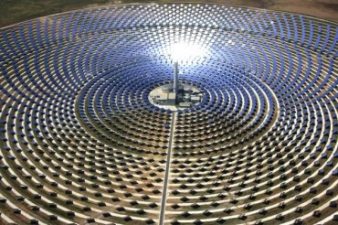 If you can’t import them, make them! That’s the sentiment behind Nadia Shalaby’s plan to spur a solar manufacturing industry in Egypt.
If you can’t import them, make them! That’s the sentiment behind Nadia Shalaby’s plan to spur a solar manufacturing industry in Egypt.
Egypt is keen to embrace solar energy. And there is no good reason not to. With steaming solar resources and enormous human capital, 80 million strong depending on who is counting, and an energy demand that brings utilities to its knees every summer, the incentives are strong.
But importing solar panels is an expensive affair and the country consistently resorts to established oil and gas regimes to power the nation. This could change if Nadia Shalaby has her way. A fellow at Massachusetts Institute of Technology’s (MIT) Legatum Center for Development and Entrepreneurship, Ms. Shalaby is investigating a plan to spur solar manufacturing in her home country.It’s a brilliant plan. At present, Egypt uses less than 1% renewable energy, according to MIT’s news service. But by manufacturing solar technology on its own soil, the country can circumvent import taxes, markups and transportation costs.
“Otherwise you’re importing technology into a developing country which cannot afford alternative energy in the first place,” Shalaby told MIT.
Shalaby suggests that by manufacturing its own solar equipment, Egypt can eliminate 50 percent of production costs. The move could also foster an R&D sector, stimulate innovation, and create much-needed clean energy jobs.
“Funding needs to be put into economic development and bottom-up projects that create jobs and move Egypt up the technology ladder,” Shalaby told Peter Dizikes, who reports that she has an undergraduate and master’s degrees from Alexandria University in Egypt, and a PhD in computer science from Harvard.
Only seven companies make polysilicon, 10-15 make wafers, 40-50 make finished cells, and then hundreds of companies turn the cells into cells and modules, according to MIT. Shalaby is confident that Egypt could at least produce its own cells and modules.
However, lifting this project off the ground will be no easy feat. Egypt is notorious for its iron-age bureaucracy and startup costs will require both public and private investment. Furthermore, a strategist with North America Gas (at BP), Niall Henderson claims that Africa’s largest population lacks the R&D track record to develop the requisite manufacturing technology.
Perhaps this is a good time to look to Masdar for help?
:: MIT
More on energy projects in Egypt:
Egypt’s Long Path to Nuclear Power
Egyptian Energy Crisis Sends Protesters to the Streets
World Bank Grants Egypt 1.2 Billion Egyptian Pounds For Wind Energy




Dear Nadia,
I am writing you regarding the manufacture of solar Cells in Egypt as I do believe it will be much easier to start it in the upcoming months.
From your point of view, what are the basics needed to start the solar manufacture project producing high quality, low cost solar products?
Thanks for your time
Karim Adel
+201227355510